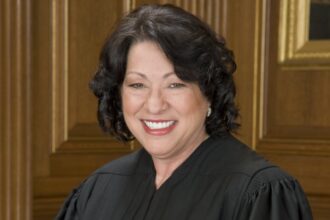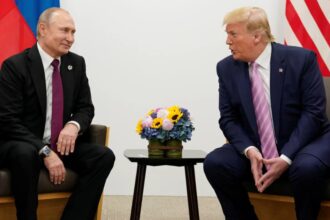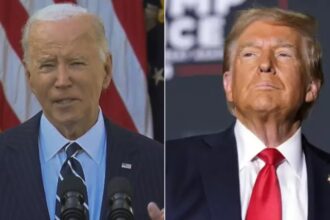The United States and Russia completed their largest post-Soviet prisoner swap on Thursday, involving 24 individuals. According to AP, this complex exchange followed months of negotiations and necessitated concessions from European countries holding Russian prisoners.
The swap saw the release of a diverse group, including journalists, political dissidents, suspected spies, a hacker, a fraudster, and even a convicted murderer.Among those freed by Russia were Wall Street Journal reporter Evan Gershkovich and Paul Whelan, a corporate security executive from Michigan, both accused of espionage charges that the US government deemed baseless. Radio Free Europe/Radio Liberty journalist Alsu Kurmasheva and Kremlin critic Vladimir Kara-Murza, who was serving a 25-year sentence for treason, were also released.
The most infamous of the eight individuals Russia received was Vadim Krasikov, convicted in Germany in 2021 for the murder of a former Chechen rebel in Berlin, allegedly under orders from Moscow’s security services. The exchange also included two alleged “sleeper” agents jailed in Slovenia, three men charged in the US, and two others returned from Norway and Poland.
This substantial exchange does not signify a betterment in US-Russia relations. Previous swaps, including the December 2022 exchange of WNBA star Brittney Griner for arms trafficker Viktor Bout, have not led to improved relations. The backdrop of ongoing Russian aggression in Ukraine and continuous US military support for Kyiv underscores the persistent hostilities.
Despite the scale of the swap, several Americans remain detained in Russia. This group includes Travis Leake, a musician convicted on drug charges; Gordon Black, an American soldier convicted of theft and threats of murder; Marc Fogel, a teacher also convicted on drug charges; and Ksenia Khavana, arrested for treason charges linked to collecting money for Ukraine’s military.
Fogel’s family expressed frustration over his exclusion from the swap, deeming it “inconceivable” and urging the Biden administration to prioritise his release. A senior administration official acknowledged the ongoing efforts to secure the release of the remaining detainees.
The US and its allies have released individuals convicted of serious crimes, including Krasikov, whose actions were tied to the Russian authorities. Krasikov’s 2019 murder of Zelimkhan “Tornike” Khangoshvili, a Georgian citizen and former Chechen rebel, was conducted under a false identity provided by Russian officials. Throughout negotiations, Russia prioritised Krasikov’s release, with President Vladimir Putin hinting at the possibility earlier this year.
In contrast, the Americans and Europeans released by Russia were predominantly held on charges considered baseless. President Joe Biden acknowledged the tough decisions involved in such deals but emphasised the importance of protecting Americans.
A notable absentee from the swap was Russian opposition leader Alexei Navalny. Discussions had included a potential exchange involving Navalny and Krasikov, but Navalny’s sudden and unexplained death in February thwarted these plans. Nevertheless, several of Navalny’s associates were released.
Politically, this swap was a significant move for President Biden, who had foreshadowed his commitment to securing the release of unjustly detained Americans. Welcoming the families of the returning Americans to the White House, Biden highlighted the importance of international alliances, subtly contrasting this with former President Donald Trump’s “America First” approach. Trump criticised the deal, incorrectly suggesting that the US had paid Russia for the exchange and questioning the release of criminals, as per AP.
The swap saw the release of a diverse group, including journalists, political dissidents, suspected spies, a hacker, a fraudster, and even a convicted murderer.Among those freed by Russia were Wall Street Journal reporter Evan Gershkovich and Paul Whelan, a corporate security executive from Michigan, both accused of espionage charges that the US government deemed baseless. Radio Free Europe/Radio Liberty journalist Alsu Kurmasheva and Kremlin critic Vladimir Kara-Murza, who was serving a 25-year sentence for treason, were also released.
The most infamous of the eight individuals Russia received was Vadim Krasikov, convicted in Germany in 2021 for the murder of a former Chechen rebel in Berlin, allegedly under orders from Moscow’s security services. The exchange also included two alleged “sleeper” agents jailed in Slovenia, three men charged in the US, and two others returned from Norway and Poland.
This substantial exchange does not signify a betterment in US-Russia relations. Previous swaps, including the December 2022 exchange of WNBA star Brittney Griner for arms trafficker Viktor Bout, have not led to improved relations. The backdrop of ongoing Russian aggression in Ukraine and continuous US military support for Kyiv underscores the persistent hostilities.
Despite the scale of the swap, several Americans remain detained in Russia. This group includes Travis Leake, a musician convicted on drug charges; Gordon Black, an American soldier convicted of theft and threats of murder; Marc Fogel, a teacher also convicted on drug charges; and Ksenia Khavana, arrested for treason charges linked to collecting money for Ukraine’s military.
Fogel’s family expressed frustration over his exclusion from the swap, deeming it “inconceivable” and urging the Biden administration to prioritise his release. A senior administration official acknowledged the ongoing efforts to secure the release of the remaining detainees.
The US and its allies have released individuals convicted of serious crimes, including Krasikov, whose actions were tied to the Russian authorities. Krasikov’s 2019 murder of Zelimkhan “Tornike” Khangoshvili, a Georgian citizen and former Chechen rebel, was conducted under a false identity provided by Russian officials. Throughout negotiations, Russia prioritised Krasikov’s release, with President Vladimir Putin hinting at the possibility earlier this year.
In contrast, the Americans and Europeans released by Russia were predominantly held on charges considered baseless. President Joe Biden acknowledged the tough decisions involved in such deals but emphasised the importance of protecting Americans.
A notable absentee from the swap was Russian opposition leader Alexei Navalny. Discussions had included a potential exchange involving Navalny and Krasikov, but Navalny’s sudden and unexplained death in February thwarted these plans. Nevertheless, several of Navalny’s associates were released.
Politically, this swap was a significant move for President Biden, who had foreshadowed his commitment to securing the release of unjustly detained Americans. Welcoming the families of the returning Americans to the White House, Biden highlighted the importance of international alliances, subtly contrasting this with former President Donald Trump’s “America First” approach. Trump criticised the deal, incorrectly suggesting that the US had paid Russia for the exchange and questioning the release of criminals, as per AP.
Source : Times of India






